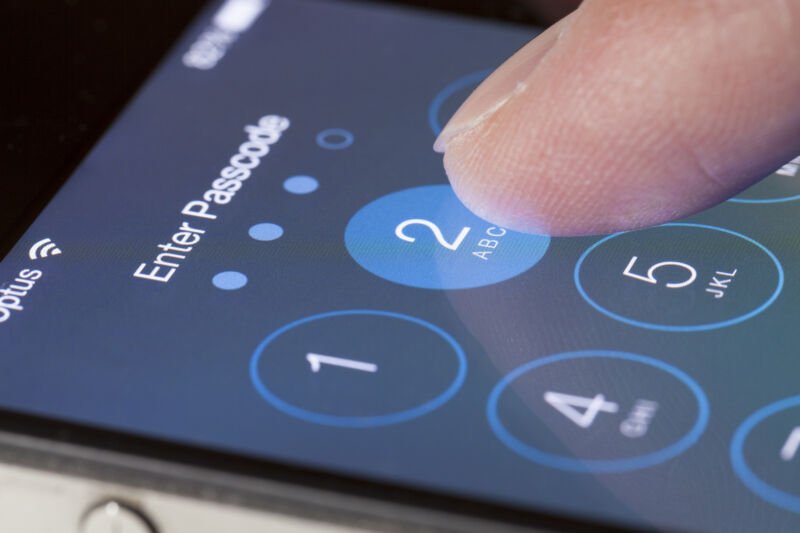
New Jersey’s Supreme Court has ruled that compelling a suspect to unlock his or her cell phone doesn’t violate the Fifth Amendment. The courts continue to be deeply split on this question. Back in June, Indiana’s Supreme Court reached the opposite conclusion, and several other state and federal courts have reached divergent positions on the issue over the last few years.
This case focuses on an allegedly corrupt cop named Robert Andrews. Andrews is a former Essex County Sheriff who allegedly tipped off a suspect named Quincy Lowery about a pending police investigation. Under police questioning, Lowery testified that Andrews had advised him to get a new phone to avoid a police wiretap. He also said Andrews helped Lowery identify an undercover police officer and an unmarked police vehicle. These allegations were corroborated by data from Lowery’s phone.
The police seized two iPhones belonging to Andrews, but investigators were unable to unlock them. Andrews refused to unlock the phones based on the Fifth Amendment, which protects against self-incrimination.
On Monday, the New Jersey Supreme Court rejected that Fifth Amendment claim. The Fifth Amendment only protects defendants against self-incriminating testimony, not the production of incriminating documents. While “testimony” usually refers to speech, that’s not always the case. Sometimes, a defendant can reveal information by his or her actions. For example, if the government doesn’t already know who owns a phone, then forcing a defendant to unlock it amounts to forced testimony that the defendant is the owner.
But that reasoning doesn’t apply in this case. The phones were registered in Andrews’ name and were in his possession. There’s little doubt that Andrews knows the passcodes. So if he’s forced to enter the passcodes to his own phones, the New Jersey Supreme Court reasoned, he’s not revealing any information that the government doesn’t already know.
Of course, the information on the phone may be incriminating. But the courts have long held that forced production of documents—even incriminating ones—is not a violation of the Fifth Amendment. The government can order a defendant to unlock a safe even if the safe might have incriminating documents inside of it.
The other side
As we mentioned before, the Indiana Supreme Court took the opposite view just two months ago. And as I wrote at the time, that was just the latest example of a deep divide among courts on this issue:
Earlier this year, a Philadelphia man was released from jail after four years of being held in contempt in connection with a child-pornography case. A federal appeals court rejected his argument that the Fifth Amendment gave him the right to refuse to unlock hard drives found in his possession. A Vermont federal court reached the same conclusion in 2009—as did a Colorado federal court in 2012, a Virginia state court in 2014, and the Massachusetts Supreme Judicial Court in 2014.
But other courts in Florida, Wisconsin, and Pennsylvania have reached the opposite conclusion, holding that forcing people to provide computer or smartphone passwords would violate the Fifth Amendment.
Courts that have found the Fifth Amendment does shield defendants against unlocking their phones have focused not on the passcodes but on the information contained in the phone. They point to a 2000 ruling in the prosecution of Bill Clinton business associate Webster Hubbell for tax fraud. Prosecutors had ordered Hubbell to provide documents in several broad categories. The Supreme Court ruled that this violated the Fifth Amendment because Hubbell wasn’t just being asked to turn over particular documents—he was using his own judgment to decide which documents fell into the broad categories the government asked about.
Courts like the Indiana Supreme Court have concluded that similar reasoning applies in cell phone unlocking cases. Governments aren’t seeking specific files on a suspect’s device, they’re seeking unfettered access to a suspect’s cell phone, giving them access to information they might not have known existed previously. Some courts have held that this kind of fishing expedition is analogous to the broad document requests in the Hubbell case.
But in Monday’s ruling, the New Jersey supreme courts pointed out a key difference: Hubbell was required to use his own knowledge and judgments to decide which documents to turn over. That compelled exercise of judgment—not just the fact that the government might get incriminating documents it didn’t know about before—was what made Hubbell’s response self-incriminating testimony. By contrast, unlocking a cell phone doesn’t require a suspect to make any judgments about the information on the cell phone.
The New Jersey Supreme Court points out that there’s a different constitutional provision that’s supposed to protect the privacy of people’s private data. That’s the Fourth Amendment, which protects “papers” against “unreasonable searches and seizures.” The New Jersey Supreme Court argues that focusing on the phone’s contents, rather than on the production of the passcode itself, “imports Fourth Amendment privacy principles into a Fifth Amendment inquiry.” If the police are engaging in improper fishing expeditions, the way to deal with that is by challenging the search warrant on Fourth Amendment grounds.
Ultimately, the only way to resolve this dispute is for the US Supreme Court to get involved. The high court hasn’t ruled on the legality of compelled decryptions of smartphones or other digital devices. Indeed, most of the Fifth Amendment caselaw in this era predates smartphones—and in many cases the personal computer, too. It would be helpful for the nation’s highest court to take this issue on and provide clarity to courts that are struggling with how to apply these decades-old precedents.
https://arstechnica.com/?p=1698156

